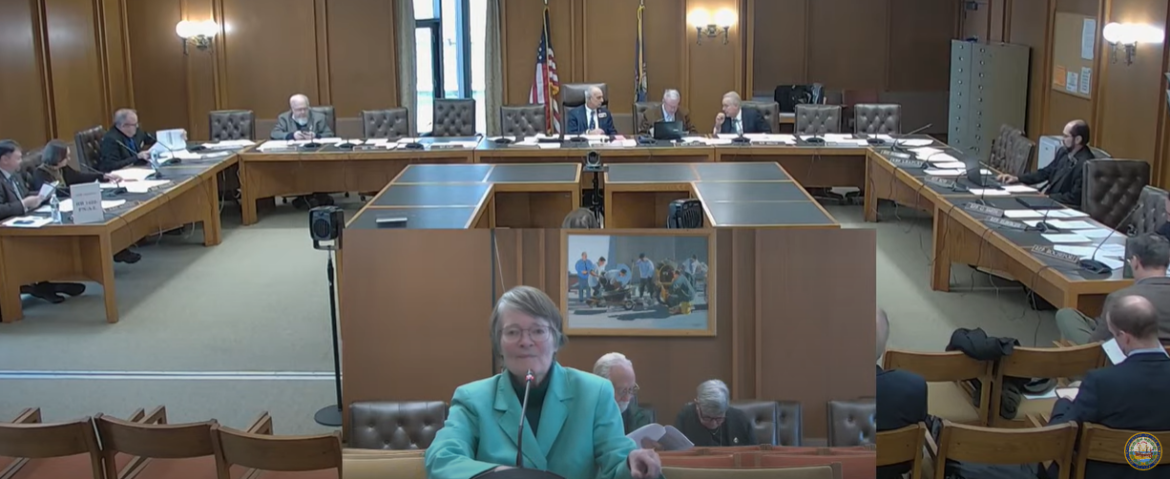By PAULA TRACY, InDepthNH.org
CONCORD – Changing taxes in the Granite State got some consideration as two bills were heard by the House Ways and Means Committee Tuesday.
An effort to cut taxes for businesses and consumers under the so-called “Consumer Tax Relief Act,” received a public hearing with Republicans saying it would help make New Hampshire more attractive to live and vacation and Democrats saying it does not address property tax relief.
The committee also heard an effort to reinstate the interest and dividends tax which is slowly being eliminated, under Lebanon Democratic Rep. Susan Almy’s House Bill 1492 https://www.gencourt.state.nh.us/bill_status/billinfo.aspx?id=1849&inflect=2.
Opponents said the measure would hurt the in-migration of people who add to the economy with their wealth.
Almy said removing the tax is a violation of the constitution that everyone shall pay an equal burden.
She said it could lead to an exodus of those who “we cannot survive without” who do low-paid work, like housekeepers.
But former state Rep. Patrick Abrami, speaking on behalf of the Granite State Taxpayers Association, said it would be bad form for the state to reverse course when people are moving here because of it and helping the economy by “hiring gardeners.”
The interest and dividends tax has been reduced for several years and last year the legislature accelerated the pace to allow for the tax to be entirely removed by the end of this year.
Former State Rep. Doug Hall of Chichester, who pays the interest and dividends tax, and was a member of the General Court more than 30 years ago, said he had come to support passage of the measure because of the issue of equity. He noted that most people are interested in property tax relief and suggested that the bill be amended to use the funds to go into the education tax fund.
Drew Cline, president of the Josiah Bartlett Center for Public Policy, said New Hampshire has had an income tax for a long time now through the interest and dividends tax, which expires at the end of this year.
When complete, it will make the state the only one in the Northeast and about the eighth in the nation without an income tax, he said. It will make the state more competitive for those looking to move here.
“All we have to do is to look at Massachusetts,” which is looking at outmigration since the millionaires’ tax was enacted,” he argued.
House Bill 1422-FN-A-L https://www.gencourt.state.nh.us/bill_status/billinfo.aspx?id=1101&inflect=2 looks to reduce over time the Business Profits Tax, Business Enterprise Tax, the Rooms and Meals Tax and eliminate the Communications Service Tax.
It would not impact revenues on the municipal side, sponsors said.
The state Department of Revenue Administration took no position on the bill but said some of the reduction dates in the bill might be a bit too aggressive for operators to implement.
State Rep. Tim McGough, R-Merrimack, noted this is “the people’s money” and currently there are surpluses in these revenue accounts. He said the bill would eliminate the 7 percent communications services tax and reduce the rooms and meals tax while keeping the municipalities whole.
The net effect, likely is more employment and in time more revenue, he said.
But Almy challenged that and pointed to a paper by former state auditor Phil Sletten published by the NH Fiscal Policy Institute.
McGough said he read and disagreed with the paper and noted he did not believe it was peer-reviewed.
State Rep. Sallie Fellows, D-Holderness, said what she is hearing from constituents is that property taxes are too high and there is a housing crisis.
“We need to reduce property taxes,” McGough agreed and claimed it will be easier if we have more money in our pockets through tax savings. But he did not give her specific ideas on how to directly reduce property taxes.
Greg Moore of Americans for Prosperity said he came in support of the “a la carte menu” of tax reduction offered under HB 1422 but he said the two consumer taxes were of less importance than reductions to the BET and the BPT.
He said input from those who collect the rooms and meals taxes, which were decreased from 9 percent to 8.5 percent, was that that did not stimulate growth.
House Majority Floor Leader Joe Sweeney, R-Salem, introduced the bill and said in a statement, “The Consumer Tax Relief Act is a crucial piece of legislation that not only reflects our commitment to fiscal responsibility but also addresses the pressing needs of Granite Staters in these challenging economic times. This bill is more than a fiscal adjustment; it is a beacon of hope and a testament to our vision for New Hampshire – a vision that positions our state as a leader in freedom and prosperity in the Northeast.”
Paula Tracy is InDepthNH.org’s senior writer with 30 years of experience.





